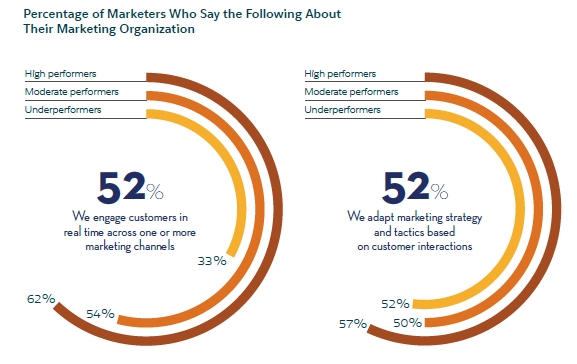The ongoing increase in priority to offer real-time personalization is positioning marketing leaders to act as the cross-functional medium for connecting customer experiences, according to new research from Salesforce. The company’s fifth edition of its State of Marketing report shows that more than half (52%) of marketers engage customers in real time across one or more channels, signaling how progressive businesses are identifying opportunities for more personalized engagement with potential customers on their terms. This can be attributed to the growing adoption of AI and increase in data sources to enhance customer engagement, according to the report.
The study surveyed roughly 4,000 marketing practitioners across the globe, ranging from industries such as retail (22%), financial services (13%), technology (11%), manufacturing (9%) and more. Close to two-thirds (63%) are either a B2B company or a “B2B2C” organization that sells to customers at both the business and consumer level. More than half (53%) held VP-level positions or higher — 26% of the respondents hold CEO, owner or equivalent-level positions.
The study shows that marketing organizations are in a prime position to unify the customer experience. More than half (54%) of high-performing marketing teams —those who said they are completely satisfied with their overall marketing performance and the outcomes of their marketing investment — lead customer experience initiatives across the business.
The study also shows that high-performing marketers are leading AI adoption, with 40% of them saying that they adopted AI in 2018. However, there is still room for growth throughout all markets. Twenty-nine percent said they used AI in 2018 when looking at the entire data set — up from 20% in 2017.
Other findings from the survey include:
- 52% of marketers share metrics with sales teams;
- High-performing marketers are 1.5x more likely than underperformers to collaborate with sales teams on ABM programs;
- 51% of marketing teams say they’re more mindful about balancing personalization and privacy than they were two years ago; and
- 52% of marketers adapt marketing strategy and tactics based on how a customer interacts with their content.
“Since marketing as a function is usually tasked with tackling new trends, CMOs and marketing organizations became the natural place to try out new things and see how it can impact the business,” said Chris Jacob, Director of Product Marketing at Salesforce Marketing Cloud, in an interview with Demand Gen Report. “This is a ripe position for solving out the new things relevant to the customer experience.”
Average Number Of Data Sources Expected To Reach 15 Per Business In 2019
To gain a deeper understanding of customer needs, the number of data sources used within businesses has continued to climb. The average number of data sources used by marketers has grown by 20% since 2017, and the survey findings show that marketers expect to use an average of 15 data sources in 2019.
However, only 47% of marketers said they have a completely unified view of their customer data sources. The company stated that this means businesses will prioritize unifying these data sources to have a complete view of the customer.
“If the marketer is leading on the customer experience, more data is coming into the marketing department — meaning a lot of data systems from each function of the business,” said Jacob. “To offer any cross-functional experience, that data needs to be unified. And this can start in marketing.”







